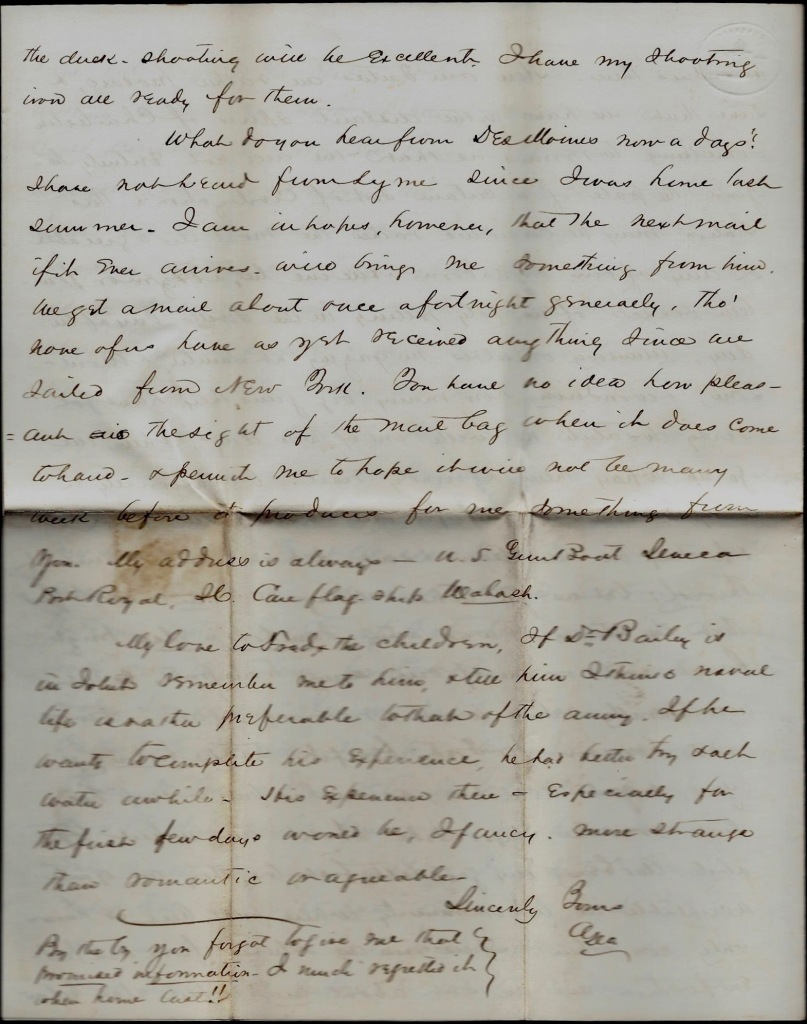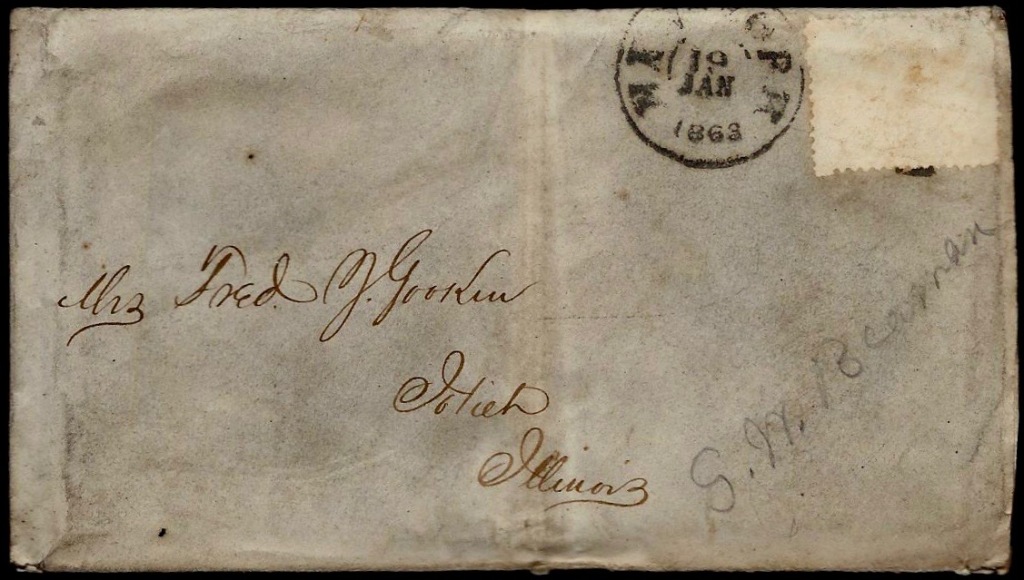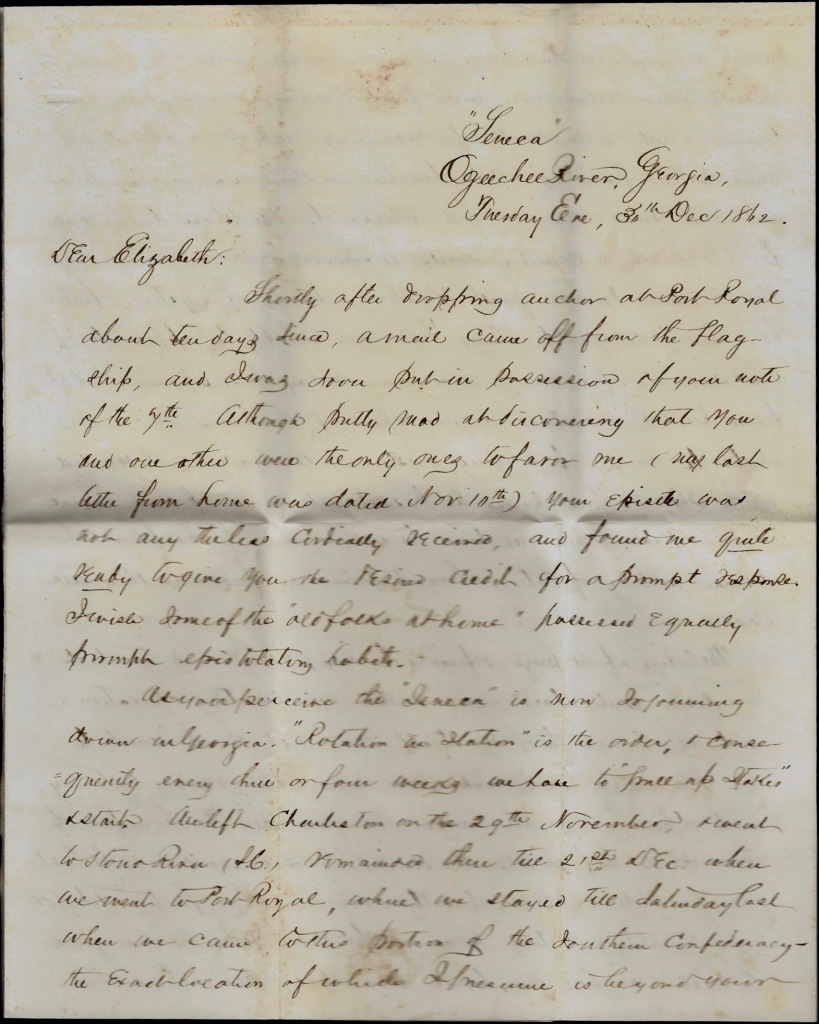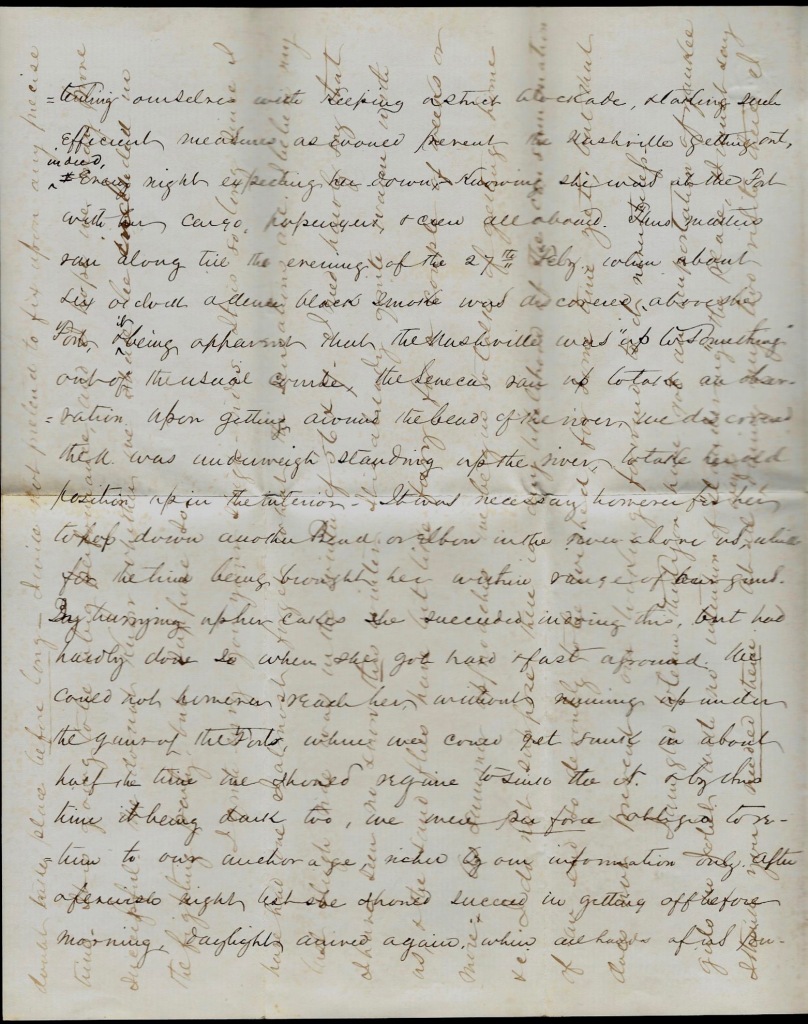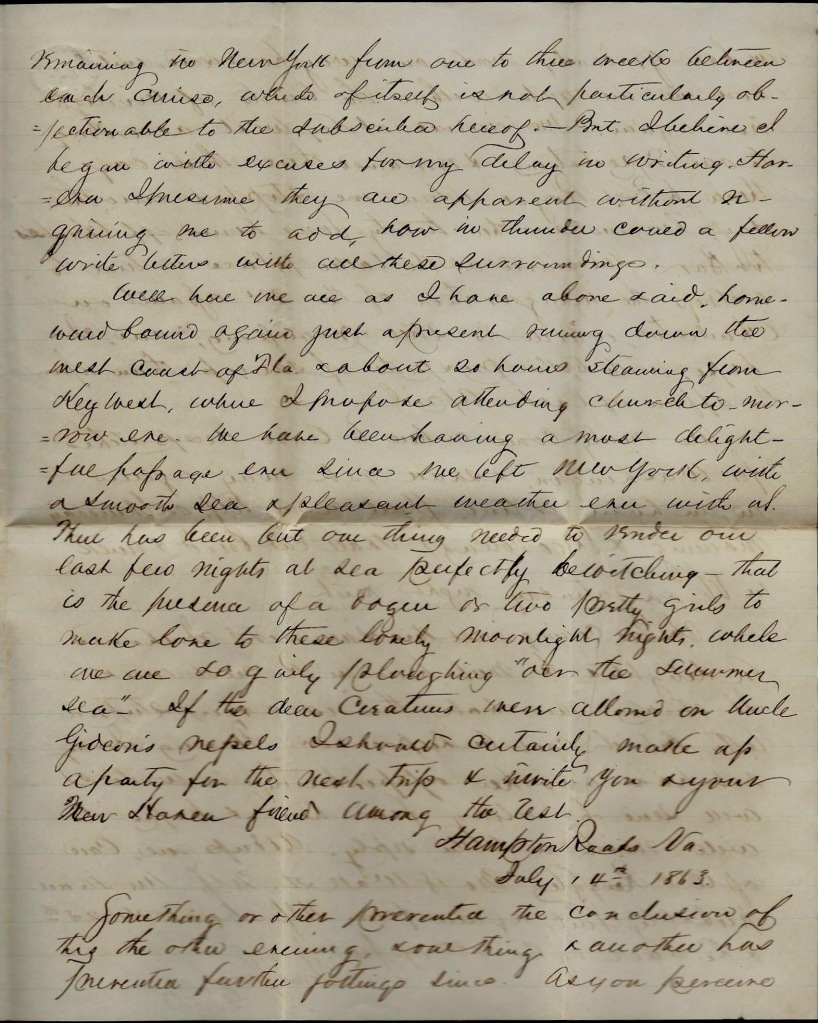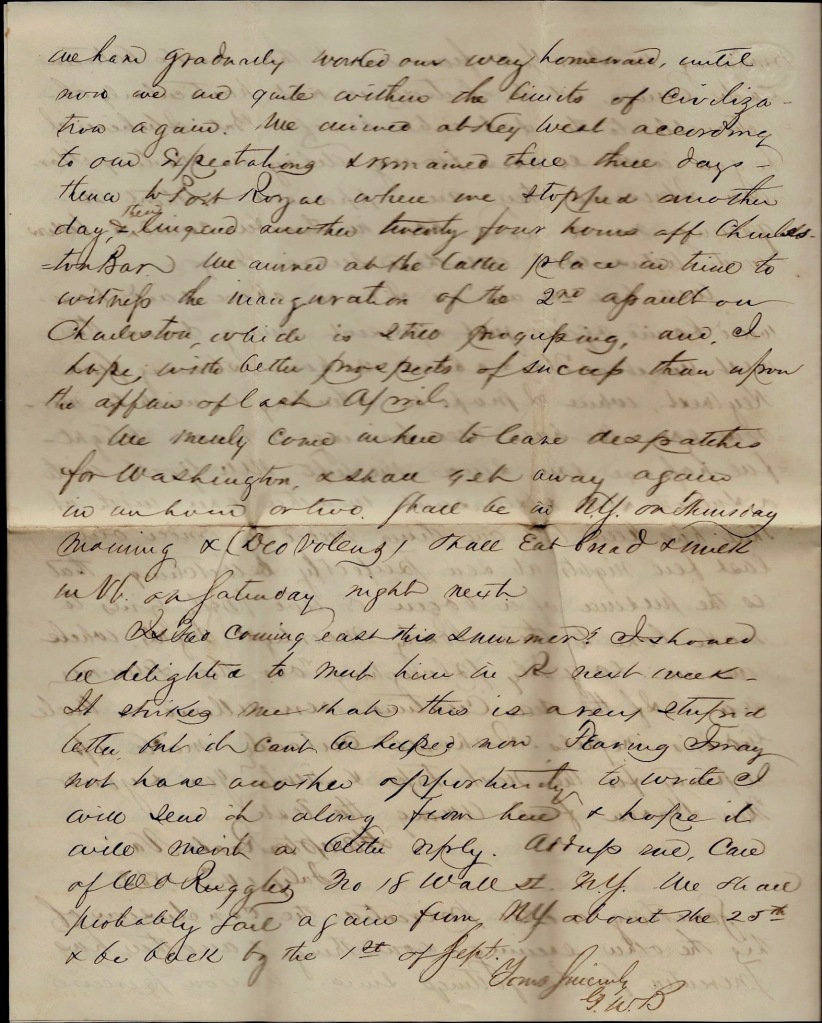These letters were written by George William Beaman (1837-1917), the son of George Hudson Beaman and Eleanor Kattelle Gookin of Rutland, Vermont. George enlisted as a private in the 3rd Missouri US Reserve Corps in May 1861 and took part in the capture of Camp Jackson in St. Louis, Missouri. From August 1861 to March 1862, he was a correspondent for the Missouri Democrat and reported on Fremont’s southwest Missouri campaign, and later in Grant’s battles at Forts Henry and Donelson.

(Heritage Auctions)
In March 1862, Beaman was appointed from Missouri as Acting Assistant Paymaster, U. S. Navy, and he was ordered to the steam gunboat Seneca in the South Atlantic Blockading Squadron. The Seneca was a wooden-hulled “ninety day gunboat” built at NYC and launched in August 1861. She and three other Union gunboats engaged and dispersed a Confederate squadron near Port Royal, South Carolina, opening the way to the capture of the city which became a naval base for the blockading squadron. On 27 January and again on 1 February 1863, the Seneca took part in the attack on Fort McAllister on the Ogeechee river in Georgia. On 28 February 1863, she supported the ironclad Montauk in the destruction of the privateer Rattlesnake, the former Confederate warship Nashville—all of which is described in George’s 3rd letter.
In May 1863, Beaman was detached from Seneca and ordered to the screw steamer Union, East Gulf Blockading Squadron. Union acted as a dispatch and supply vessel, but compiled an impressive list of captures, mostly in Florida and Georgia. Beaman detached from Union in August 1864, and ordered to Mound City, Ill., in December for duty as Assistant Purchasing Paymaster. From February to August 1865, he was assigned to the Mississippi Flotilla.
George wrote the letters to his uncle Fred Gookin’s wife, Elisabeth Annette (Patrick) Gookin (1830-1895)—-not much older than himself—of Joliet, Will county, Illinois. The Gookins’ had two children, Frederick William Gookin (1853-1936) and Mary Helena Gookin (1855-1915).
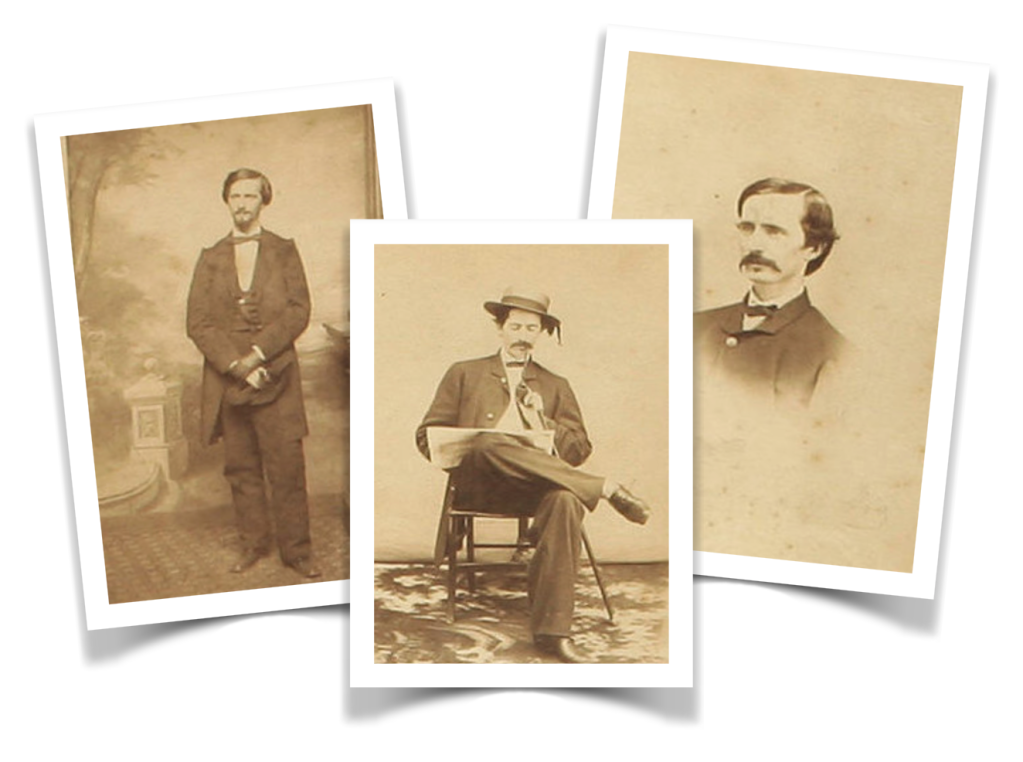
(Heritage Auctions)
Letter 1
US Gunboat Seneca
Off Charleston, S. C.
Thursday Eve, 6 November 1862
My Dear Aunt,
Although you may ere this and with good reason come to that conclusion I have not forgotten a promise I once made to write you a letter one of these days. In proof of which fact you will please take this, which, like the man who painted the bear, I will add is a little, or something religiously intended to be very much like one.
This is one of those evenings when the romantic nautical story tellers have it that poor Jack gathers under the forecastle and thanks his stars that he ain’t on dry land where there are steeples & chimneys & trees &c. to blow down on his head. That is to say, it is blowing a regular nor’easter & raining if anything about as hard as it blows. And we in the Seneca are tossing about with both anchors over and a lea shore near enough to enable us to hear the breakers. It may be there is someone on board who would object to dry land tonight, but I have yet to meet the person who would not be entirely willing to run the risk of all falling chimneys, if he could conveniently enjoy the fireside comforts a night ashore. However, we are not so very bad off. Down here in the ward room there are four of us quietly smoking, reading and writing, and if the ship only would keep a little steadier, would be quite comfortable. Yet folks always will be perverse enough, you know, to wish themselves exactly where they are not.
you have probably heard that my first absence from home was hardly so lengthy as was anticipated. I sailed from Boston on the 2nd of August, joined my ship on the 11th at Warsaw Sound, Georgia, & on the 4th September was in New York. We were allowed to remain in Gothom until the 15th of October when we again took our departure for Port Royal—the headquarters of the squadron. Here we safely arrived on the 19th. On the 20th we received orders to go to St. John’s river, Florida. Remained there a day, returned to Port Royal, & on the 25th duly arrived here where we have been lying ever since, engaged in blockading duty.
I was in hopes that we might have remained in St, John’s river for awhile, & gone up to Jacksonville, and it. is now quite likely that before the winter is over we may be ordered there. Here our duties are rather prosaic & save that we have in the distant spires of Charleston something to remind us that we are not entirely beyond the pale of a certain sort of civilization, this station may be considered rather the most disagreeable of any of our squadron. Here we be, a dozen or fourteen vessels of us, idly rolling in the swells day after day, amusing ourselves in gazing at Sumter and Moultrie & wondering how many big guns they have got ready to attack us with one of these days when we go up to pay them a visit.
Occasionally a stray sail is discerned far out at sea & we up anchor & putting on all steam and sail, set out in hot pursuit thereof. But as yet it has always been our luck to find that the stranger was wither somebody’s else prize bound north, or one of our army transports, so we consequently return to our moorings again. I will add, however, for Fred’s benefit, that the fishing is good and quite available, as one has but to drop his line over the ship’s side about anywhere to get a bite and bring very good table fish too. They are quite acceptable in a community where fresh beef is known only now and then. If we ever are relieved from our present position, and are sent about anywhere else below, the duck-shooting will be excellent. I have my shooting iron all ready for them.
What do you hear from DesMoines now-a-days? I have not heard from Lyme since I was home last summer. I am in hopes, however, that the next mail if it ever arrives will bring me something from him. We get a mail about once a fortnight generally. Though none of us have as yet received anything since we sailed from New York. You have no idea how pleasant the sight of the mail bag is when it does come to hand & permit me to hope it will not be many weeks before it produces for me something from you. My address is always—U. S. Gunboat Seneca, Port Royal, S. C., Care of flagship Wabash.
My love to Fred, the children. If Dr. Bailey is in Joliet, remember me to him and tell him I think Naval life is rather preferable to that of the army. If he wants to complete his experience, he had better try salt water awhile. His experience there—especially for the first few days—would be, I fancy, more strange than romantic or agreeable.
Sincerely yours, — Geo.
By the by, you forgot to give me that promised information. I much regretted it when home last!!
Letter 2
[Acknowledgement: My thanks to Stacy Cookenour for providing me with the first draft of this transcription.]
Seneca
Ogeechee River, Georgia
Tuesday Eve., 30th December 1862
Dear Elizabeth,
Shortly after dropping anchor at Port Royal about ten days since, a mail came off from the flagship, and I was soon put in possession of your note of the 7th. Although pretty mad at discovering that you and one other were the only ones to favor me (my last letter from home was dated Nov. 10th), your epistle was not any the less cordially received, and found me quite ready to give you the desired credit for a prompt response. I wish some of the “old folks at home” possessed equally prompt epistolatory habits.
As you perceive, the “Seneca” is now sojourning down in Georgia. “Rotation in station” is the order, & consequently every three or four weeks we have to “pull up stakes” & start. We left Charleston on the 29th November & went to Stono River (SC), remained there till 21st Dec. when we went to Port Royal, where we stayed till Saturday last, when we came to this portion of the Southern Confederacy, the exact location of which I presume is beyond your present geographical knowledge. However, if you take the trouble to consult your atlas, you will find Ogeechee River, duly laid down a little to the south of Savannah, which is about 25 miles distant from us. Our location in Stono was a very pleasant one, & we were all loathe to leave it. The place itself was for this southern country really picturesque & then, besides, we had excellent duck & quail shooting, plenty of oysters, fish, etc. The latter qualifications Fred will be able to appreciate if you cannot. It is hardly necessary to say, I suppose, that I fished, hunted, & oystered a good share of the time. The most [recherche?] mode of serving oysters on the Seneca is roasted on the shell. You should be present at some of our engine room repasts, where we throw the oysters in by the half bushel and make nothing of eating a barrel or two as fast as they are cooked.
The taking of the prize referred to by you, & in regard to which you desire “particulars” was rather an exciting operation with us, though the prize itself was not worth much to us. The night we caught her, was dark, rainy, & stormy, with a heavy sea running. We gave her the benefit of three [warning] shells before she concluded to surrender—the last one of which exploded directly over her, but fortunately (or unfortunately) hitting none of the crew. In exchanging the crew, we had one boat swamped, two others stove, & several men very nearly drowned. To add to all the rest of the confusion, a sloop of war near us, taking us for a prize begun giving us the benefit of their battery—fortunately not hitting us, however. Everybody got wet to the skin in the pouring rain, & taking all things into consideration, we had considerable of a night of it. The vessel and cargo was worth about $14,000 & had we caught it out of signal distance of the rest of the fleet would have been a very decent prize, but when divided among the ten or twelve other vessels of the fleet off Charleston, will hardly pay us for the wetting we got. Vessels capturing prizes are entitled to one half their value distributed pro rata among officers & crew according to the pay received by them. Although we gained nothing in a material point of view in this instance, we had still the éclat of catching the only prize captured while we were there- which was something.
Friday Eve, 2nd January 1863
The steamer Blackstone came in a few hours since with our beef, ice, vegetables, mail, &c. Steaming at daylight in the morning affords us an opportunity to send letters, so I have concluded I might as well finish this, which for some cause, was left incomplete the other evening. Well, New Years has come & gone. A more quiet New Years I never passed. As you can imagine, I did not indulge in many New Year’s calls, but compromised by paying my devoirs to various and sundry ducks & [?].
The Blackstone brings us down the intelligence that the long delayed attack on Charleston will soon transpire. We have received similar information from various sources, and I’m inclined to think that the great event is now not very far off. Before we left Port Royal we were promised by the admiral “a hand in” in the entertainment & shall accordingly soon look forward for orders to move in that direction. Exactly what part the gunboats will have in the affair, we do not know, but if the statement that we are to “pitch in” with the ironclads proves true, somebody’s gunboat, if not more, will be very apt to get hurt.
The mail this evening only brought me a letter from Sis and I was more disgusted with my correspondents than ever. The last letter I rec’d from Lyme was while home in July last, & while you were there, I believe. I believe I am indebted to Aunt Adelaide for a letter & I intend to give her the benefit of a dispatch before many weeks are passed. Ada writes me that grandfather has had quite a bad turn, which, however, I hope has not proved anything serious. He is getting very old though and I should not be surprised to hear of his death at any time.
Caroline, it seems from Sis’ letter had concluded to let a visit by Arlington & Albany compensate her for the loss of a winter “out west.”
We have out never failing source of enjoyment here—the weather. More delightful winter weather on any other type of weather, one need not desire. The nights are cool, with occasionally a frost & the days bright & sunshiney, rendering one’s very existence a pleasure. If you were down here I think I could at least reconcile you to “inside” boat sailing among the islands & innumerable creeks & inlets with which the whole country is penetrated. We have a battery of the enemy on the river about three miles above our anchorage, but as there is no especial necessity of taking it at present, we do not interfere with them to any great extent—save now & then running up, dropping a few shell at them, getting a few sent back in unpleasant proximity, and then, having sufficiently reminded them that we were there, departing again. There are two other vessels with us here & Captain Gibson being senior officer, we are accordingly “flagship.”
My love to Fred & the children. Tell Mary if I should happen to find a cat down here, I will send her one, or if she would like a coon better I could accommodate her now. Just now indeed I am devoting my entire energies to the capture of coons, having no less than five traps, amongst us, on a little island abreast of which we are anchored & where coons congregate in considerable numbers. Do not let me fail to let me hear from you again before long. You have no idea what a comfort a good letter is when exiled down here. In the meantime, believe me, sincerely yours, — George.

Letter 3
Seneca
Ossabaw Sound, Georgia
Sunday eve, 15th March 1863
My Dear Elizabeth,
Yours of the 15th February found us still in the Ogeechee [River] & just at the time of its receipt in the midst of considerable excitements—viz: in making preparations for the last attack on Fort McAllister with the ironclads, the result of which you have doubtless heard. I believe—indeed, “come to think of it”—I know—all of our affairs with this somewhat redoubtable rebel fortification have transpired since I last wrote you.
The first attack was made on the 27th January by the ironclad Montauk, the Seneca, Wissahickon, & Dawn. On the 1st of February, with the same force, another unsuccessful attack was made of some four or five hours duration. These attacks developed the important fact that the fortification was located in such a peculiar position, and the river below was so narrow and obstructed so well by torpedoes, spiles, &c., that it was hardly likely that it could be reduced by any naval force which could be brought against it. So for the next three weeks or so we relapsed into a torpid state of affairs, consented ourselves before the fort & to the great joy of all found the Nashville still here. In this instance, the ironclad proved a valuable investment. While we wooden gunboat fellows engaged the fort at long range, the Montauk steamed close up under the fort & uninjured by the iron hail which would have sunk us in five minutes, opened on the Nashville. The shells exploding in her midst & among her cargo of cotton & [ ] soon started aflame and before we left she was in a perfect sheet of flames from stem to stern. Shortly after her powder magazine exploded & by night, little remained of the famous Nashville.
We now supposed that this was the last visit we should have to Ft. McAllister for with the Nashville out of the way, the Fort is of no earthly account to us, but what was our surprise to find that evening another ironclad coming in over the bar & bringing the intelligence that on the morrow we should have two more ironclads & three mortar schooners to join us in still another attack on the rebel stronghold. Of course this formidable force had been started from Port Royal before the Admiral had heard of the destruction of the Nashville but being here it was decided to let the fight go on.
In the midst of the arrival of the vessels, your letter made its appearance, and as I read it, I thought I should in my reply be able to give you the news not only of the destruction of the Nashville, but of the reduction of Fort McAllister as well. But alas! the fort proved as invincible to ironclads as to wooden vessels & after a bombardment of eight hours on the part of the iron vessels & the mortar schooners, & a continuation all the night on the part of the latter, the job was given up. None of the wooden vessels participated in the last performance & we had a very pleasant view of the fight without the unpleasant concomitants of shells bursting over and around us. All of the ironclads have now returned to Port Royal, and the only vessels left here now are the Seneca & Dawn.
Our station is now down in the Ossabaw Sound which, as warm weather is coming on, is rather pleasanter than up in the marshes. How much longer we are to remain here, of course, we do not know. Having been in the vicinity since the 27th of December, we are quite willing for a change of scene. The long talked of attack on Charleston which has been going to transpire in two or three weeks for the last four months, will without doubt take place before long. I will not present to fix upon any precise time. It is going to be a big performance and I hope we may prove successful. We do not know whether we shall be included in the fighting party but suppose so.
I quite envy you your sleigh rides. It is so long since I have had one I almost forgot what the sensations are. I believe my last sleigh ride was in the winter of ’56 & 7. I need hardly say that I have seen no snow this winter. It is already quite warm with us and the sand flies have bit like fury for a couple of weeks or more. As summer approaches, we begin to talk of getting home &c. I do not suppose there is any likelihood of the consummation of an end so devoutly to be wished for some time yet, but that does not prevent our looking forward to it nevertheless.
I am glad to learn that you have got an importation of Yankee girls in Joliet with no intention of “slandering” the place. I must say I think you needed them. Above [ ] I think my two visits there, I did not see many young ladies who were particularly lovable, to say the least. Of course I did not dare hint at the time before Lyme. I have received one letter from Lyme this winter and that is all. He does not see, to think the grocery business a particularly romantic employment. In fact, I guess he is rather tired of it. Mrs. Munger I wrote to a few weeks ago & I hope I may get a response sometime in the course of the present year. When you write to the Captain, give him my regards & tell him I should be very happy to meet him at Charleston.
I enclose you a piece of the Nashville which you can add to your relics. Being a Yankee, I suppose of course you have the Yankee fondness for souvenirs. This one is not hardly as valuable as would be a piece of the renowned Alabama but you can console yourself with the thought that if the Nashville had ever got out to sea, she would shortly have been quiet as renowned, or that if the Seneca had been sent out in chase of the Alabama, the present relic would have been out of her sides.
I beg ten thousand pardons for giving you the trouble of “cyphering” out these cross lines and it is in this instance a military or perhaps—to speak a little correctly—a naval necessity. The reason is the stock of postage stamps on the Seneca just at present has become sadly reduced & as there is no chance of our getting any for a week or ten days to come, we are obliged to economize—at least not indulge in any double headers.
My love to Fred and the children. Remember me to Charley Munger and wife when you see them. You have my address correctly, it being the same at [ ] times. I hope we will soon have occasion to use it as we did. I assure you, it will be a pleasure that I hear from you at all times. Sincerely yours, — George
Letter 4
U. S. Steamer Union
West Coast, Florida
Saturday Even 4th of July, 1864
My dear Elizabeth,
It has just occurred to me that in lack of patriotic or exciting employment on this anniversary (haven’t time to cypher out the number) of our “great and glorious Independence,” I could hardly do better than to cancel a long standing obligation to you. I presume ere this you have concluded that I was treating your last somewhat cavalierly, which I will admit, but I believe Have rather more and better reasons for my neglect than usually cause the assistance of procrastinating correspondents. To begin with, you see, your last reached me the lawyer part of last April while the Seneca was lying at North Edisto Isle in daily expectation of being ordered to Port Royal for the purpose of having our boilers surveyed, which must result, so the engineer’s said, in our being sent North for repairs. On the 6th of May, the long expected orders made their appearance. We immediately went to Port Royal and on the 13th were “homeward bound.” We were ordered to Philadelphia at which place we safely arrived on the 18th.
I found it impossible to get away for the first week or two after our arrival & was fast making arrangements for a trip to where I was greeted with an official document with G[ideon] Welles’ signature attached, detaching me from the Seneca & ordering me, after the transfer of my accounts, stores, &c. to my successor, to report at New York for duty on the Union. So here I had to “____ to” for a couple of weeks work at Philadelphia, then rushed on to New York & relieved my predecessor here, and on the 18th of June, just one month from the time I had arrived at Philadelphia, I found myself steaming out of New York Harbor en route for Pensacola, without having seen one of my relatives & scarcely one of my friends.
However, there is “a good time coming.” We are now “homeward bound” once more, & this time with a very good prospect of seeing the Green Mountains & my Vermont sweethearts. The Union to which I am now attached is a supply steamer for (at present) the East Gulf Squadron, extending from Key West to Pensacola. She is a fine ocean steamer—larger than two Seneca’s, with spacious quarters—& in many respects the change is a very pleasant one and as it is also a complimentary change on the part of the Department, I suppose I ought to feel duly honored. We make about monthly trips, remaining in New York from one to three weeks between each cruise, which of itself is not particularly objectionable to the subscribed hereof. But I believe I began with excuses for my delay in writing. However, I presume they are apparent without requiring me to add how in thunder could a fellow write letters with all these surroundings.
Well, here we are as I have above said, homeward bound again just at present, sailing down the west coast of Florida & about 20 hours steaming from Key West where I propose attending church tomorrow eve. We have been having a most delightful passage ever since we left New York with a smooth sea & pleasant weather even withal. There has been but one thing needed to render out last few nights at sea perfectly bewitching—that is the presence of a dozen or two pretty girls to make love to these lonely moonlight nights, which we are so gaily ploughing “over the summer sea.” If the dear creatures were allowed on Uncle Gideon’s vessels, I should certainly make up a party for the next trip & write you and your New Haven friend among the rest.
Hampton Roads, Va.
July 14, 1863
Something or other prevented the conclusion of this the other evening & one or another has prevented further jottings since. As you perceive, we have gradually worked our way homeward until now we are quite with the limits of civilization again. We arrived at Key West according to our expectations & remained there three days—thence to Port Royal where we stopped another day, and then lingered another twenty-four hours off Charleston Bar. We arrived at the latter place in time to witness the inauguration of the 2nd assault on Charleston which is still progressing, and, I hope, with better prospects of success than upon the affair of last April.
We merely come in here to leave dispatches for Washington & shall get away again in an hour or two. Shall. be in New York on Thursday morning & (Deo volen’s) & shall eat bread and milk in Vermont on Saturday night next.
Is Fred coming East this summer? I should be delighted to meet him in Vermont next week. It strikes me that this is a very stupid letter but it can’t be helped now. Fearing I may not have another opportunity to write, I will send it along from here & hope it will merit a better reply. Address me care of W. A. Ruggles, No. 18, Wall Street, New York. We shall probably sail again from New York about the 25th and be back by the 1st of September.
Yours sincerely, — G. W. B.




